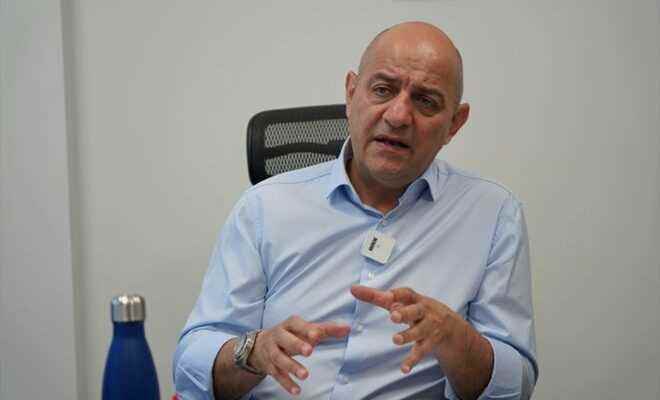Vacationers in Ayia Napa, a popular seaside resort in Cyprus, July 17, 2022 (AFP / Etienne TORBEY)
In Ayia Napa, a popular seaside resort in Cyprus, the party has resumed its rights after two years of pandemic, but without the flow of Russian tourists, once the second contingent of visitors after the British, a void difficult to fill.
“This year, we were expecting 800,000 Russian tourists” (as in 2019, editor’s note), explains Haris Loizides, head of the Cyprus Hotel Association. A threshold now impossible to reach because in the first six months of the year, only 17,000 Russian tourists came to the Mediterranean island, according to official statistics.
The Russian market “was wiped out overnight” following sanctions imposed by the European Union after Moscow invaded Ukraine, notes Christos Angelidis, president of the Pancyprian Association of Hotel Managers.
Nicosia and Moscow have close political and cultural ties, but when Russia sent troops to Ukraine, the Cypriot parliament unanimously passed a resolution condemning the invasion.

Aerial view of Ayia Napa, a popular seaside resort in Cyprus, July 17, 2022 (AFP / Etienne TORBEY)
Western sanctions against Russia now deprive Russians of direct flights to Cyprus, an EU member state located four hours by plane from Moscow. “No one was prepared” for this, he continues.
According to the Ministry of Tourism, the absence of Russian visitors could represent a shortfall of 600 million dollars.
“There have been many attempts from different sectors to encourage tourists from other countries to come, for example Germans, Poles, Italians and French,” said Charis Papacharalambous, spokesperson for the Association of Cyprus Travel Agents (ACTA).
But it is “very difficult to fill the big void” left by Russian tourists, he says.
– Impossible to replace –
In 2019, before the start of the Covid-19 pandemic, the key tourism sector accounted for 15% of GDP and 20% of the 3.9 million tourists were Russians.

Vacationers in Ayia Napa, a popular seaside resort in Cyprus, July 17, 2022 (AFP / Etienne TORBEY)
The Cypriot destination has long been popular with Russians, some 18,000 of whom live there, particularly in the coastal city of Limassol, also known as “Limassolgrad” or even “Moscow-on-the Mediterranean”.
Last year, despite the anti-covid measures in force, 520,000 Russians came to the island, or just over a quarter of the total number of tourists.
Tourism in Cyprus is nevertheless doing better this year than last with 1.2 million visitors to the island from January to June (nearly five times more than last year) who come for many between them lounging on the white sand beaches and enjoying the night parties, especially in Ayia Napa.

Aerial view of Ayia Napa, a popular Cypriot seaside resort, July 17, 2022 (AFP / Etienne TORBEY)
“Our hotel is doing well, but this is not the case for the other establishments, which had an exclusively Russian clientele,” adds Mr. Angelides, also manager of the Napa Mermaid hotel.
But if overall tourist attendance rebounded in the first six months of the year compared to 2021, it remains 25% lower compared to the same period in 2019, before the pandemic.
In the first months of 2022, British tourists represented just over 40% of visitors, followed by Israelis (7.3%), Poles, Germans, Swedes and Greeks.

Haris Loizides, head of the Cyprus Hotel Association, in Nicosia, July 20, 2022 (AFP / Etienne TORBEY)
“We have somewhat limited the damage, but it is impossible to replace the large number of” Russian customers, adds Mr. Angelides. And the impact of their absence could get even worse as many of them chose to come to the island during the off season.
The invasion of Ukraine with soaring electricity prices has also penalized the hotel sector of this country where air conditioners run at full speed in summer with temperatures that regularly exceed 35 degrees in the shade.
“The air conditioning is working at full speed” and the electricity bills are reaching “astronomical amounts”, underlines Mr. Loizides, who is asking for help from Brussels: “The EU must remedy this situation and help companies, especially at a time where inflation is raging”.
© 2022 AFP
Did you like this article ? Share it with your friends with the buttons below.




